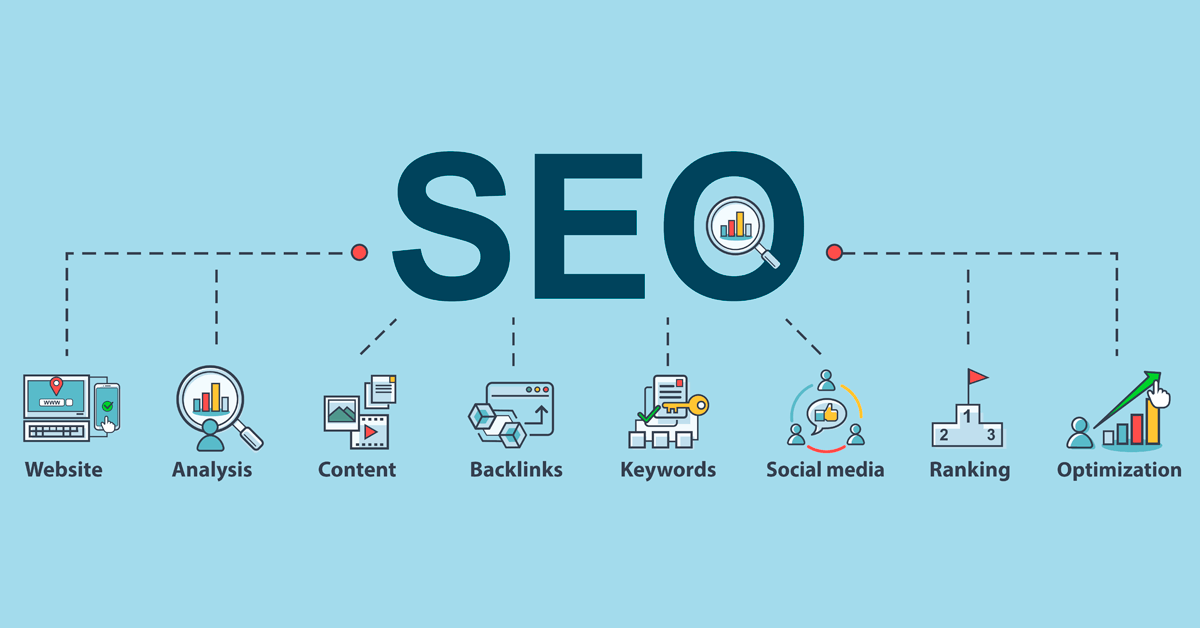Search Engine Optimization, or SEO, is a crucial digital marketing strategy that can help businesses improve their online visibility, attract more organic traffic, and increase their revenue. However, to succeed in this field, you need to have a solid understanding of the fundamentals of SEO. In this article, we will discuss what to study in Search Engine Optimization.
1. How does a search engine work?
Search engines use complex algorithms to crawl, index, and rank web pages based on relevance, authority, and user experience. Here is a simplified overview of how a search engine works:
- Crawling: Search engines use software called crawlers or spiders to crawl the web and discover web pages. The crawlers follow links from one page to another and collect information about each page they visit, including the text, images, and links.
- Indexing: Once a search engine crawler discovers a web page, it indexes the page by analyzing the content and storing it in a massive database. The index contains information about the page’s content, structure, and keywords.
- Ranking: When a user enters a search query, the search engine retrieves relevant pages from its index and ranks them based on several factors. These factors include keyword relevance, content quality, page speed, backlinks, and user engagement metrics.
- Displaying results: The search engine displays the most relevant and authoritative pages in the search engine results page (SERP), typically in order of their ranking.
It is important to note that search engine algorithms are continually evolving, and factors that affect a website’s ranking may change over time. Therefore, it is crucial to keep up-to-date with the latest SEO trends and techniques to stay ahead of the competition.
2. The current search engine market:
As of May 2023, Google is the dominant player in the global search engine market, holding a market share of approximately 92%. Bing, Yahoo, and Baidu are the other significant search engines.
Here is a breakdown of the current search engine market share:
- Google – 92%
- Bing – 2.5%
- Yahoo – 1.8%
- Baidu – 1.2%
- DuckDuckGo – 0.7%
- Yandex – 0.5%
- Others – 1.3%
It is important to note that search engine market shares may vary depending on the region and device type. For example, Google dominates the desktop search engine market, while Baidu is the leading search engine in China.
As the search engine market is continually evolving, businesses and marketers must keep up-to-date with the latest trends and developments to ensure they optimize their website for the right search engines to reach their target audience effectively.
3. What does SEO do?
SEO, or Search Engine Optimization, is a set of techniques and practices aimed at improving a website’s visibility and ranking in search engine results pages (SERPs). By optimizing a website’s content and technical elements, SEO can help attract more organic traffic, increase brand awareness, and generate more leads and conversions.
The goal of SEO is to help a website rank higher in search engine results pages, so it is more likely to be seen by users searching for relevant topics or keywords. This increased visibility can lead to more clicks, visits, and engagement, ultimately resulting in higher conversions and revenue for businesses.
In essence, SEO helps ensure that a website is easily accessible and relevant to both users and search engines. It involves a combination of strategies, including keyword research, content optimization, link building, and technical optimization, to improve a website’s authority, relevance, and user experience.
4. Types of SEO:
On-page SEO and off-page SEO are the two main categories of SEO. There are some differences these are-
- On-page SEO:
On-page SEO involves optimizing the content, structure, and HTML source code of your website to improve its ranking in search engine results pages. This includes optimizing your website’s title tags, meta descriptions, header tags, content, images, and internal links. On-page SEO also involves ensuring that your website is user-friendly and easy to navigate, with fast page load times and mobile responsiveness.
- Off-page SEO:
Off-page SEO involves building external links and social signals to improve your website’s authority and reputation. This includes building backlinks from other high-quality websites, as well as social media shares and mentions. Off-page SEO also involves managing your online reputation by monitoring and responding to online reviews and comments about your business.
Both on-page and off-page SEO are essential components of a comprehensive SEO strategy, and they work together to improve your website’s visibility and ranking in search engine results pages. Other types of SEO techniques include technical SEO, local SEO, and mobile SEO, which focus on optimizing specific aspects of your website or targeting specific audiences.
5. White Hat, Black Hat, and Grey Hat SEO Techniques:
White Hat, Black Hat, and Grey Hat SEO techniques refer to different methods used to optimize a website for search engines. These techniques are categorized based on their ethical standards, and it is important to understand the difference between them to avoid any potential penalties or negative impacts on your website’s ranking.
- White Hat SEO Techniques:
White Hat SEO techniques are considered ethical and legitimate methods to improve your website’s ranking in search engine results pages. These techniques focus on creating high-quality content that provides value to users and optimizing technical elements of the website to enhance user experience. Typical White Hat SEO strategies include:
- Research keywords for your website to find relevant and popular search terms.
- Making content of a high calibre that appeals to your target market.
- Optimizing title tags, meta descriptions, and header tags to improve the website’s structure.
- Building high-quality backlinks from reputable websites.
- Optimizing website loading speed and mobile-friendliness.
2. Black Hat SEO Techniques:
Black Hat SEO techniques are considered unethical and manipulative methods to improve your website’s ranking in search engine results pages. These techniques are designed to deceive search engines by artificially inflating the website’s relevance and authority. Search engines may impose penalties or even completely ban users who use Black Hat SEO tactics. Here are a few examples of typical Black Hat SEO tactics:
- Keyword stuffing – Overusing keywords to manipulate search engine rankings
- Hidden text or links – Adding hidden text or links to deceive search engines
- Cloaking – Search engines and consumers might see alternate material using cloaking.
- Link farming – Creating artificial backlinks from low-quality and irrelevant websites
- Spamming – Sending unsolicited emails or comments with links to the website
3. Grey Hat SEO Techniques:
Grey Hat SEO techniques are considered neither fully ethical nor fully unethical. These techniques use a combination of White Hat and Black Hat techniques to improve a website’s ranking in search engine results pages. The problem with Grey Hat SEO is that search engines may perceive them as unethical, which can result in penalties. Some common Grey Hat SEO techniques include:
- Buying connections from unreliable or pointless websites
- Guest posting on websites that accept low-quality content
- Repurposing old content to create new content
- Over-optimizing anchor text in backlinks
So, it is important to understand the ethical standards of SEO techniques to avoid any negative impacts on your website’s ranking. Using White Hat SEO techniques can help you achieve long-term success in improving your website’s visibility and ranking in search engine results pages.
6. SEO Terms and Definitions:
SEO involves a lot of technical jargon that can be overwhelming for beginners. Some essential terms and definitions to understand include keywords, meta tags, backlinks, SERPs, PageRank, and Domain Authority. Familiarizing yourself with these terms can help you better understand the world of SEO.
In conclusion, studying Search Engine Optimization involves learning how search engines work, staying up-to-date with the current search engine market, understanding the types of SEO techniques, and familiarizing yourself with SEO terms and definitions. By gaining a solid understanding of these fundamentals, you can develop an effective SEO strategy and improve your website’s visibility and ranking in search engine results pages.

